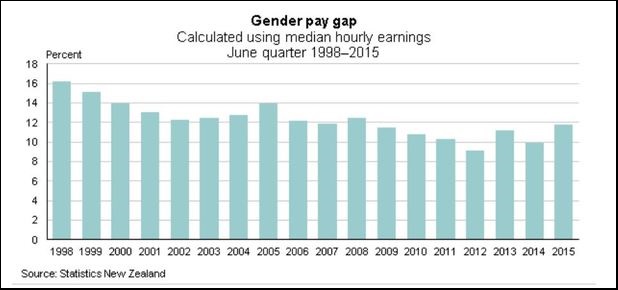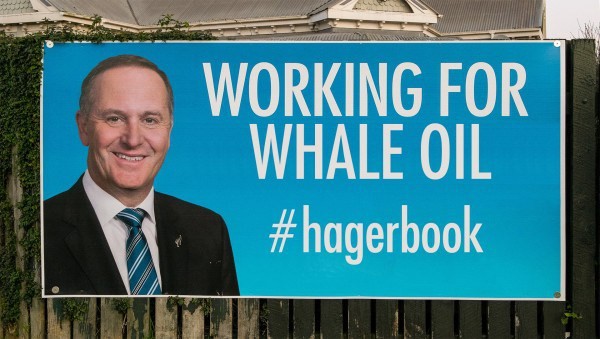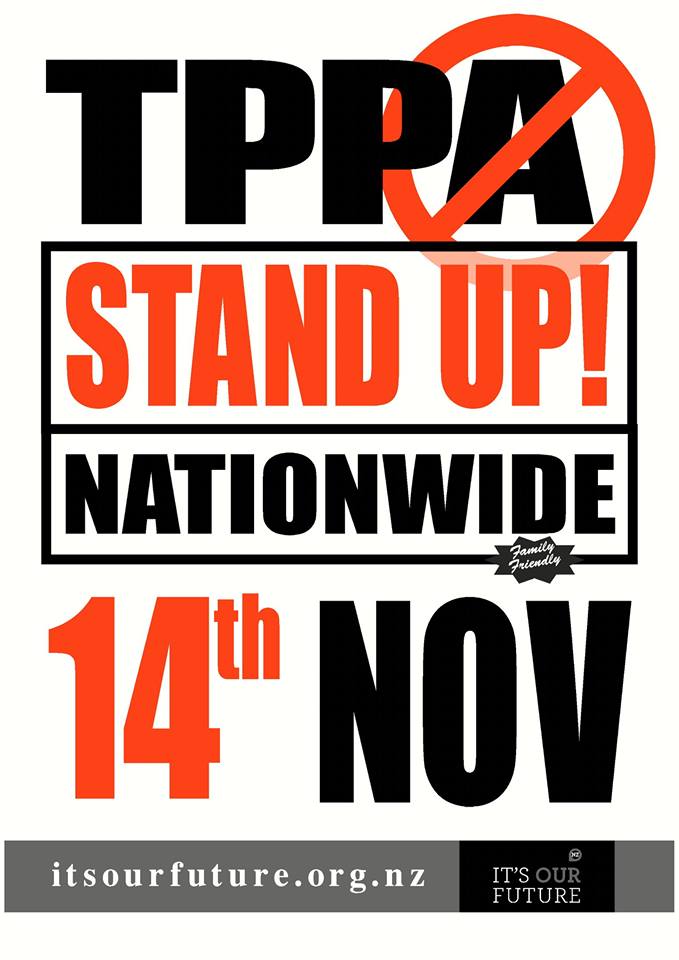.
.
Fun Fact #1
Since 1986, there have been no less than seven tax cuts in New Zealand;
1 October 1986 – Labour
1 October 1988 – Labour
1 July 1996 – National
1 July 1998 – National
1 October 2008 – Labour
1 April 2009 – National
1 October 2010 – National
Fun Fact #2
John Key says he supports New Zealanders paid higher wages. In fact, he stated that desire in 2007, and repeated it in 2008, 2009, 2010, 2011, and 2012;
.
“We think Kiwis deserve higher wages and lower taxes during their working lives, as well as a good retirement.” – John Key, 27 May 2007
.
“We will be unrelenting in our quest to lift our economic growth rate and raise wage rates.” – John Key, 29 January 2008
.
“We want to make New Zealand an attractive place for our children and grandchildren to live – including those who are currently living in Australia, the UK, or elsewhere. To stem that flow so we must ensure Kiwis can receive competitive after-tax wages in New Zealand.” – John Key, 6 September 2008
.
“I don’t want our talented young people leaving permanently for Australia, the US, Europe, or Asia, because they feel they have to go overseas to better themselves.” – John Key, 15 July 2009
.
“Science and innovation are important. They’re one of the keys to growing our economy, raising wages, and providing the world-class public services that Kiwi families need.” – John Key, 12 March 2010
.
“We will also continue our work to increase the incomes New Zealanders earn. That is a fundamental objective of our plan to build a stronger economy.” – John Key, 8 February 2011
.
“The driving goal of my Government is to build a more competitive and internationally-focused economy with less debt, more jobs and higher incomes.” – John Key, 21 December 2011
.
“We want to increase the level of earnings and the level of incomes of the average New Zealander and we think we have a quality product with which we can do that.” – John Key, 19 April 2012
Mr Key has not repeated those statements since April 2012.
Fun Fact #3
The gender pay gap in New Zealand has worsened, from 9.9% last year to 11.8% this year;
.
.
Timeline
Kristine Bartlett and the Service and Food Workers Union lodge a claim with the Employment Relations Authority, alleging Ms Bartlett’s employer Terranova Homes and Care Ltd was in breach of the Equal Pay Act 1972.
Ms Bartlett’s case referred to the Employment Court as it raises an important question of law.
A preliminary Employment Court hearing held on questions of law.
Landmark ruling on equal pay welcomed
Unions are hailing an Employment Court decision which allows a female rest home caregiver to argue she is underpaid because she is in a female-dominated industry.
Hutt Valley woman Kristine Bartlett is arguing her employer Terranova Homes is violating equal pay for equal work legislation, saying she would get more money if she was not working in an industry dominated by female staff.
The Employment Court held a preliminary hearing after Terranova Homes argued the court could only compare staff within its own workplace and not look at other workplaces.
The three court judges say the legislation makes specific provision for work predominantly performed by women.
The law says pay rates must be the same as male employees with the same, or substantially similar, skills, responsibility and service performing the work under substantially similar conditions and with substantially similar effort.
The judges said there was no way gender discrimination in pay could be removed if they could not compare pay rates more widely.
Terranova appealed this ruling to the Court of Appeal.
A decision on a landmark pay equality case has been reserved by the Court of Appeal.
The Employment Court last year found in favour of Lower Hutt caregiver Kristine Bartlett, who argued her $14.32 hourly pay rate was a result of gender discrimination under the Equal Pay Act.
The ruling – which paves the way for pay equality in the female-dominated aged care sector – has been challenged in the Court of Appeal by Ms Bartlett’s employer, Terranova Homes. The two-day hearing finished yesterday with the decision by Justices Mark O’Regan, Lynton Stevens and Christine French reserved.
The Court of Appeal has supported an Employment Court decision which ruled that a Lower Hutt rest home worker should receive pay parity with other equivalent sectors.
Kristine Bartlett won her landmark Employment Court case last year – arguing that being paid less than 15 dollars per hour, despite working in rest homes for over 20 years, was discriminatory. Her employer, Terranova Homes and Care, took the issue to the Court of Appeal. But the Appeal Court has dismissed the appeal, saying the language and purpose of the Equal Pay Act back up the decision by the Employment Court.
Today the New Zealand Aged Care Association will appeal to the Supreme Court on behalf of TerraNova Homes and Care Limited in their case with the Service and Food Workers’ Union and Kristine Bartlett.
“This case has vast implications for all New Zealanders and we felt compelled to have the highest court in the land settle the questions around the Equal Pay Act 1972 once and for all,” said Martin Taylor, CEO of the NZACA.
“In handing down its recent judgement, the Court of Appeal said the decision was finely balanced with strong arguments favouring both sides. We believe the issue must be seriously looked at and tested again.
Supreme Court denies Terranova leave to appeal in landmark pay equity case
The Supreme Court has denied aged care provider Terranova Homes and Care, at the centre of a landmark court case paving the way for gender pay equity, leave to appeal the ruling.In October the Court of Appeal dismissed an appeal by Terranova Homes against an earlier Employment Court ruling backing Lower Hutt rest home worker Kristine Bartlett’s claim that women care workers’ low pay was discriminatory. She took a case against her employer, arguing her $14.32 an hour pay rate was a result of gender discrimination under the Equal Pay Act.
The Service and Food Workers Union also made a claim on behalf of 15 other caregivers employed by the company, asking for a statement of the general principles to be observed for implementing equal pay.
In a Supreme Court decision out this afternoon, the judges said it considered the company’s appeal premature.
Equal pay on the way for women?
The government has set up a taskforce to look into pay equity issues, which could lead to a change to the current law.
Minister for Workplace Relations and Safety Michael Woodhouse said unions and employers had agreed to a working group to establish principles for dealing with pay equity claims.
It had been prompted by a recent Court of Appeal decision on pay rates in the aged care sector, which found women in predominantly female workforces were paid less.
Early 2016
Case scheduled to go before the Employment Court to early 2016 (dates to be determined).
(Acknowledgement: Much of the above Time-line, with exceptions, is re-published from the New Zealand Aged Care Association.)
The Case: exploited labour
The case of Kristine Bartlett is a relatively simple one. For twentytwo years working-experience in rest-home facilities she earned just barely above minimum wage. Since the 1990s, her wages have risen by $5.
Ms Bartlett’s profession is predominantly female, and like many female-dominated professions, it is paid less than male-equivalent jobs.
As Fairfax media Christie Hall wrote on 19 January;
On 23 August 2013, the Employment Court ruled that Ms Bartlett’s was in fact underpaid because she worked in a female-dominated industry. (The document is well-worth reading and provides sound, rational, and carefully-constructed argument for advancing equal pay for women.)
Subsequent Court decisions have upheld the Employment Court (see Timeline above).
The NZ Aged Care Association (NZACA) has expended large sums of money on legal action to thwart the cost of raising wages for aged-care workers. NZACA fears the increased cost of a ballooning wages-bill impacting on it’s members, which has traditionally relied on low-paid labour to operate.
In October 2014, in a press release published on nzdoctor.co.nz, NZACA stated;
Unfortunately the Government subsidy for aged care is not enough for providers to make a profit. Over the last decade, 200 aged care facilities have closed primarily for financial reasons. The majority of these facilities relied on the government’s subsidy for their revenue.
[…]
The existing aged care sector cannot afford to increase all aged care worker’s wages at an estimated cost of $120 – $140 million alone – the sector will need increased Government subsidies to prevent further closures of our aged care facilities.
In an undated statement on NZACA’s website, the Association states;
The Government contract undervalues the worth of caregivers working in the private aged care sector. A caregiver working in a District Health Board geriatric hospital receives on average $17.50 an hour compared with an average hourly rate of $15.30 in our sector.
NZCA has been lobbying Government for many years to put more money into this sector which cares for New Zealand’s most vulnerable citizens.
And in November 2014, NZACA’s CEO, Martin Taylor, stated;
“Another reason why we need to appeal is that there are hundreds of rest homes operated by individuals and community trusts from Kaitaia to Bluff who have told us they would close if wages went up significantly and funding stayed the same.
When you understand this reality we have no option but to appeal, despite everyone agreeing caregivers are worth more.”
On 23 December last year Service and Food Workers Union National secretary, John Ryall, said it was about time the Government took responsibility to achieve gender pay equity;
“The Government is the sector funder and it is really up to it to decide whether it wants a resolution to the long standing pay equity issue,” he said.
Encouraging National to act will be no easy task to achieve.
Bronwen Beechey, writing for Fightback! on 17 April 2015, pointed out National’s apalling track record when it came to implementing equal pay legislation;
The Employment Equity Act was passed in 1990, but repealed within months after the National Party came to government.
In 2009, the current National government abolished the Pay and Employment Equity plan of Action and the Pay and Employment Equity Unit that had been set up in the Department of Labour in 2004.
A cynic would suggest that low wages assist National to reduce the amount it has to pay to subsidise aged-care workers. It is providing a service ‘on-the-cheap’, in a way similar to fast-food chains employing staff at minimum wage, to produce high-carb, fat-laden, ‘fast food’.
In fact, it would not be the first time that National has been exposed as supporting low wages – despite Key’s pious utterances otherwise.
Three and a half years ago, on 10 April 2011, on TVNZ’s Q+A, English made his now-infamous comments justifying a low-wage economy;
“Well, it’s a way of competing, isn’t it? I mean, if we want to grow this economy, we need the capital – more capital per worker – and we’re competing for people as well…
… we need to get on with competing with Australia. So if you take an area like tourism, we are competing with Australia. We’re trying to get Australians here instead of spending their tourist dollar in Australia.”
Three years later, on 30 July 2014, John Key appeared to ‘forget’ his earlier pronouncements on increasing wages when he responded to a question in Parliament from David Cunliffe;
Hon David Cunliffe: Will the Prime Minister support the pay increase for the quarter of a million workers who would directly benefit from Labour’s minimum wage changes, which will provide a significant boost to the economy through boosting workers’ spending power?
Rt Hon John Key: In a word, no. The reason for that is I am not so irresponsible that I would say to 6,000 New Zealanders that they are losing their jobs because the Labour Party is polling at 25 percent—
No wonder E Tu union spokesperson, Alistair Duncan, was wary of how National would respond to the Court rulings, as he said on 21 October;
“This is a well-timed and very smart move – if we can deliver genuine equal pay, it will be a very good thing. But it’s not certain and we now need to work very hard to make sure we get equal pay for equal value.”
Meanwhile, as aged-care workers (and low-paid women workers in other industries) have had their case validated by the Courts, employers are not so happy. A new ‘bogey-man’ was erected by the Employers and Manufacturers Association CEO;
Employers and Manufacturers Association chief executive Kim Campbell said the task force would need to establish clear terms of reference, because comparing the relative value of different jobs was complex.
He said any decision to boost pay rates in some industries would come with a cost.
“The government has the greatest interest in this because they’re paying for most of the aged care and hospital workers and they must be concerned that if you increase their salaries, people’s taxes may go through the roof.”
This argument that, by increasing wages, people’s taxes “may go through the roof” is not just over-the-top scare-mongering – but is instructive of the mentality of individuals like Kim Campbell.
The argument that Campbell is putting forward is that taxpayers are entitled to cheap labour.
Is this the inevitable consequence after seven tax cuts, spanning twentynine years?
Because if reduced tax revenue has resulted in central government being unable to pay fair wages for workers (whether as state sector employees or subsidised workers in the private sector), then we have created a rod for our own backs.
Regardless whether sufficient tax revenue exists or not, Campbell’s suggestion that taxpayers are somehow justified in expecting an exploited workforce is odious. It is attempting to re-create a quasi-modern-day slave work-force.
The Employment Court addressed this very issue in it’s 22 August 2013 Judgment:
History is redolent with examples of strongly voiced concerns about the
implementation of anti-discrimination initiatives on the basis that they will spell
financial and social ruin, but which prove to be misplaced or have been acceptable as
the short term price of the longer term social good. The abolition of slavery is an old
example, and the prohibition on discrimination in employment based on sex is both a
recent and particularly apposite example. [pg 32]
If successive governments were foolish in cutting taxes (usually as election bribes) to such a level that the State can no longer afford to pay for services New Zealanders expect as of right, then the solution is crystal clear: raise taxes.
Or go without.
I doubt many National-voting New Zealanders will happily contemplate a future in their dotage without a workforce of aged-care staff who are remunerated sufficiently to wipe the spittle from their wrinkled chins; change their faeces-and-urine-soaked underwear; and all the other myriad tasks associated with necessary good care.
Just how much do New Zealanders want aged-care in their twilight years?
If we do, we should be prepared to pay for it.
National Prompted to act
The successful court cases supporting Kristin Bartlett’, equal-pay case has prompted National to finally move on the problem;
The government has set up a taskforce to look into pay equity issues, which could lead to a change to the current law.
Minister for Workplace Relations and Safety Michael Woodhouse said unions and employers had agreed to a working group to establish principles for dealing with pay equity claims.
It had been prompted by a recent Court of Appeal decision on pay rates in the aged care sector, which found women in predominantly female workforces were paid less.
Mr Woodhouse said there were other cases before the courts.
“We believe the most efficient way to deal with that, and to step back and take a look at what the principles for pay equity might look like is to get this working group together, and I’m very pleased we’ve been able to do that.”
Unions had agreed to put legal action on hold until March 2016 to allow the working group to proceed, he said.
This problem could never be resolved without government involvement. By subsidising aged-care workers, it is in effect, a secondary employer, and therefore has responsibilities to make good an untenable and unfair situation.
Otherwise, if National cannot resolve this decades long problem, more radical and direct solutions need to be considered.
Possible solutions
- Where aged-care facilities are non-profit, increase subsidies paid directly to workers or change their employment status to State employees, with similar pay rates, benefits, and protections.
- Where an aged-care company, are profit-making ventures that return a dividend to shareholders, such Oceania (45 facilities), Ryman (25 facilities), and Radius (19 facilities), they should be made by law to increase the wages of their staff first and foremost.
- Nationalise the aged-care industry. Looking after the elderly should not be an “industry” where the profit motive (in many instances) is the guiding principle. This should be no more acceptable than having primary schools or hospices run as businesses.
If private enterprise cannot pay it’s workers a fair wage, as well as operate effectively, then the State has a responsibility to intervene and assume a more direct role.
Neo-liberal activists and fellow-travellers may balk at such a suggestion, but they should consider one important factor they may have forgotten: we all grow old eventually. Including free-marketeers.
Appendix1
Legislation.
Court may state principles for implementation of equal pay
The court shall have power from time to time, of its own motion or on the application of any organisation of employers or employees, to state, for the guidance of parties in negotiations, the general principles to be observed for the implementation of equal pay in accordance with the provisions of sections 3 to 8.
Appendix2
Employment Court.
[108]
Reference was also made to the likely high costs of adopting a broader
approach, if it leads to a significant wage increase for the plaintiff members.
The Aged Care Association made the point that it receives funding from the Government,
via the Ministry of Health, on a per bed basis and that it would not be able to absorb
any increase. Although the Ministry was invited to appear as intervener it apparently
declined to do so. Accordingly, we did not have the benefit of hearing from it. In
any event, it is apparent that the Government of the day, in promoting the Bill, was
aware of the potential financial implications of the legislation. The Minister
of Labour made the point that female industries would feel the greatest impact in terms
of cost, a point later echoed by the Hon E S F Holland. [pg 31]
[109]
Further, and more fundamentally, the expressed concerns relating to cost
overlook one important point, namely the unquantifiable cost (including societal
cost) of adopting an approach which may have the effect of perpetuating
discrimination against a significant and vulnerable group in the community simply
because they are women, doing what has been described as undervalued women’s work. [pg 32]
[110]
History is redolent with examples of strongly voiced concerns about the
implementation of anti-discrimination initiatives on the basis that they will spell
financial and social ruin, but which prove to be misplaced or have been acceptable as
the short term price of the longer term social good. The abolition of slavery is an old
example, and the prohibition on discrimination in employment based on sex is both a
recent and particularly apposite example. [pg 32]
– Employment Court – Judgment: 22 August 2013
Appendix3
Employment Court.
Never let it be said that the Employment Court is bereft of a sense of humour, as this comment suggests;
The purpose of the Equal Pay Act is plain, and is reflected in its long title. [p 9]
Appendix4
On 2 April, Aged Care Association’s CEO, Martin Taylor, left his role at NZACA and assumed a new position as Labour leader, Andrew Little’s, director of research and policy. The nzdoctor.co.nz press release refers to Taylor’s role in the Kristin Bartlett equal-pay case.
.
.
.
References
Ministry for Women: Gender pay gap
Radio NZ: Caregivers back equal pay campaign
New Zealand Aged Care Association: Equal Pay Case
TV3 News: Landmark ruling on equal pay welcomed
NZ Herald: Landmark pay equality case decision reserved
Scoop media: Court dismisses appeal by Hutt rest home, supports decision on equal pay
Scoop media: TerraNova Case Appealed To Supreme Court
Scoop media: Supreme Court denies Terranova leave to appeal in pay case
Radio NZ: Equal pay on the way for women?
Radio NZ: Landmark ruling for women
Fairfax media: Where next for equal pay
Nzdoctor.co.nz: Understanding caregiver wages in aged residential care
Fightback!: Fight for Equal Pay continues
TVNZ Q+A: Guyon Espiner interviws Bill English (April 2011)
Parliament: Hansards – Wage Rates – Growth, Inequality, and Minimum Wage
Legislation: Equal Pay Act 1972
Employment Court: Judgment: 22 August 2013
Nzdoctor.co.nz: Andrew Little headhunts Aged Care boss Martin Taylor
Additional
NBR: National bows to minimum wage myths – ACT
NZ Herald: Battle to close the pay gap
Previous related blogposts
“It’s one of those things we’d love to do if we had the cash”
John Key’s track record on raising wages – 4. Rest Home Workers
Aged Care: The Price of Compassion
.
.
.
.
.
= fs =


















